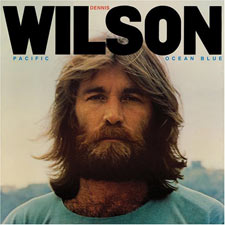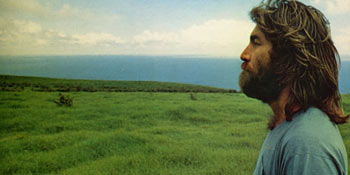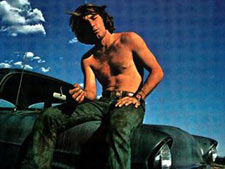In Rock ‘n’ Roll history books, Beach Boys’ leader Brian Wilson is invariably labeled a genius and middle brother Dennis is described as the heart and soul of the group.
Dennis’ own compositions were absolutely unique: intuitive, passionate, almost classical in many instances. His output was limited to one solo album and about a dozen Beach Boys tracks.
The release of Pacific Ocean Blue: Legacy Edition – which includes over an hour of previously unreleased material – offers a chance to reassess this remarkable talent.
Despite the band’s image, Dennis was the only member to actually surf, and in many ways, Brian simply documented his brother’s exploits in song. As the title of one biography puts it, Dennis was The Real Beach Boy.
He spent his life battling demons, many not of his own making.
Growing up under the iron fist of an abusive, alcoholic father, all three brothers struggled with serious personal issues throughout their lives.
Dennis gravitated to wild experiences, and – in the best and worst sense – lived life to the fullest. He introduced the band to both Transcendental Meditation and Charles Manson, who – in a charitable gesture gone wrong – had taken over Dennis’ home.

In addition to his classic good looks, he had a magnetic presence that translated onto the screen. He received rave reviews for his starring role in 1971’s Two Lane Blacktop, but lost interest in the craft and never acted again.
His only solo album, 1977’s Pacific Ocean Blue was a masterpiece.
Songs of longing, loneliness and loss – but most of all, love – showed a heart open and wounded. He managed to convey vulnerability without coming across as self-indulgent.
Spiritual sensibility weaves freely through many songs, as on ‘Dreamer’: “I knew a carpenter who had a dream / Killed the man but you couldn’t kill the dream / Who said it was easy?”
‘Friday Night’ mixes the sacred with more immediate gratification: “I believe my Jesus / is in my soul / Come on my brother / Let’s Rock ‘n’ Roll.”
On ‘You and I’ he sings: “I never seen the light people talk about / You open up my wallet and dust falls out / But that’s okay with me.” This was closer to reality than some might realize. Cash, furniture and possessions were given away freely to anyone in need, friends or strangers. Music applied, too: when ‘You Are So Beautiful’ was a top ten hit for Joe Cocker in 1975, Billy Preston was listed as composer, yet more than a few claim to have witnessed Dennis write the song. He sang it in concert for the rest of his life, but never bothered to dispute his name being left off the credit.
‘Farewell My Friend’ was written after a friend’s father had died in Dennis’ arms. A moving tribute, its lyric was eerily prescient: “You take the high road / I’ll take the low road / And we’ll meet again.” Wilson’s life began to slide downhill soon after. Within five years, he would be dead.
Despite the heartbreak, it never gets morose. ‘Rainbows,’ for instance, is a celebration of life, where “I want to know the funky things.”
 ‘End Of The Show’ closes the album with a benediction: “At the end of the show / Memories are real / It’s wonderful to know we’re alive… / Thank you very much for everything you’ve ever wanted / Thank you very much for everything you’ve ever needed / Thank you very much for everything you’ve ever dreamed of.”
‘End Of The Show’ closes the album with a benediction: “At the end of the show / Memories are real / It’s wonderful to know we’re alive… / Thank you very much for everything you’ve ever wanted / Thank you very much for everything you’ve ever needed / Thank you very much for everything you’ve ever dreamed of.”
Isolated, the lyrics might come across as trite, but coupled with Wilson’s heartfelt delivery they border on profound.
The multi-layered symphonic arrangements give way to quiet, introspective passages, followed by straight-ahead rockers; even a samba.
Wilson was only 32 years old when the album was released, but his intense lifestyle had already begun to take a toll on his voice. In many ways, the husky, at times whispered vocals – like worn leather – only add to the intensity.
The album received rave reviews, and a solo tour was planned, then abandoned. Instead, Wilson – seemingly disinterested in career moves or increasing his own profile – remained with the Beach Boys, playing drums on stage and singing the occasional song.
Before Pacific Ocean Blue was even finished, he had begun work on what was provisionally titled Bambu.

Unheard until now, the album is every bit the equal of its predecessor.
The mix of spiritual and worldly continues, as in the gospel sounding ‘Wild Situation’: “My Lord, thank you for the sweet inspiration / Thank you for the love that I found… / Thank the Lord for his angel on the ground, who took me to the Promised Land.”
‘Love Remember Me’ is a heartbreaker: “People live, people die / People laugh, people cry / I wanna love, I wanna love / So love, remember me.’
Wilson had an affinity for street people, and ‘He’s A Bum’ pokes fun at how close he himself was.
In 1983, at 39 years old, Dennis drowned while attempting to salvage a wedding picture of an ex-wife that had been thrown from his boat during an argument.
“Everything that I am or will ever be is in the music,’ he once claimed. “If you want to know me, just listen.”
In an American Idol culture, his music is like a powerful tonic for those who crave something deeper.
© John Cody 2008